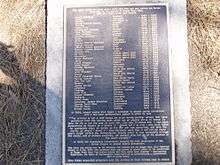George David Silva
| George Silva | |
|---|---|
| Born | 1884 |
| Died |
10 June 1912 Brisbane, Australia |
| Criminal penalty | Death |
| Criminal status | Executed |
| Conviction(s) | Murder |
George David Silva (1884 – 1912) was an Australian mass murderer. Silva, who was of Sinhalese descent, worked as a farmhand on a property owned by Charles Ching at Alligator Creek, about 20 miles from Mackay, Queensland.
On 16 November 1911, Charles Ching told Silva he was traveling to town for supplies and money for Silva's wages. While he was away Silva murdered the six Chings after the eldest daughter Maud had rejected his advances. The bodies of Agnes, Maud, Hugh and Winnie were found in the house. Mother and eldest daughter had been shot by a revolver and a muzzle-loading rifle, while the boy and baby had their skulls smashed in. The bodies of Teddy and Dolly Ching were found a mile and a half away; both had been shot and their skulls smashed in.
Police and aboriginal trackers inspected the crime scene, and after the trackers stated that there was no trail to follow the police homed in on Silva. Silva, fearing a lynch mob from Mackay, eventually confessed to police.
Tried only for the murder of Maud Ching, Silva was hanged at Boggo Road Gaol in Brisbane on 10 June 1912 and buried in South Brisbane Cemetery.[1]
Victims

- Agnes Ching, wife of Charles Ching
- Maud Ching, 17 daughter of Charles Ching
- Teddy Ching, 10 son of Charles Ching
- Dolly Ching, 8 daughter of Charles Ching
- Hugh Ching, 4 son of Charles Ching
- Winnie Ching, 20 months daughter of Charles Ching
References
- ↑ Silva George David — Brisbane City Council Grave Location Search
- Main, Jim ‘’Hanged , Executions in Australia’’
External links
- Tragedy at Mackay, The Sydney Mail (22 November 1911)
- A terrible tragedy, Northern Territory Times and Gazette (15 December 1911)
- Fearful tragedy, Poverty Bay Herald (20 November 1911)
- Queensland murder case, Poverty Bay Herald (21 November 1911)
- The Ching tragedy, Poverty Bay Herald (20 November 1911)
- The Ching tragedy, Poverty Bay Herald (30 November 1911)